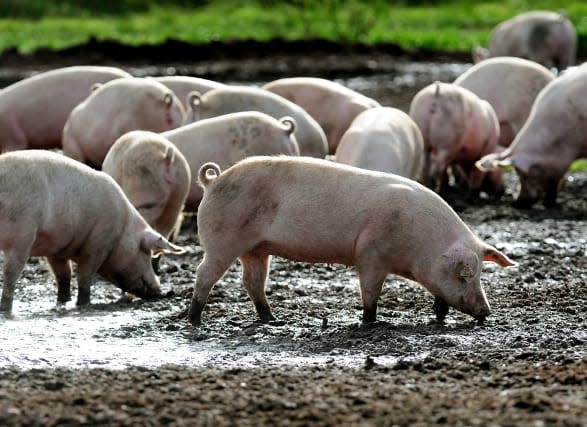Farmers turning to old-fashioned security measures as cost of rural theft rises

The cost of rural crime - such as livestock and tractor theft - has risen at its fastest rate in eight years, new figures show.
Almost £45 million worth of rural theft was committed across the UK in 2017 - up 13.4% on the previous year, data from insurer NFU Mutual shows.
Farmers and rural residents are now turning to "medieval" security methods to secure their land from increasingly "brazen" thieves in 4×4 cars, the Rural Crime Report said.
Police cuts and a rising workload are thought to be a cause of the increase, leaving rural residents looking to the history books to find ways to protect themselves.

Wales saw the sharpest rise in the cost of rural crime, reporting a 41% jump on the previous year.
Meanwhile, the north east was the only region in England which reported a fall - of 6.5%.
Scotland also experienced a 3.8% drop in the cost of rural crime.
In the regions, the cost of rural crime was up almost a third (32%) in the midlands and increased 30% in the south east.
The West Midlands, Surrey and Northamptonshire were the counties which saw the biggest increases in the cost of rural theft.
Modern security measures such as tracking devices, CCTV and motion sensors are being backed up with "protective animals" including llamas, geese and dogs employed as old fashioned alarms.
Garden equipment, quad bikes and horseboxes were among the top 10 targeted items around the UK, the report also shows.

Farmers are putting up earth banks "last used to protect medieval manors" and stockade fences, among other defences, to deter tech-savvy burglars.
It follows this year's National Rural Crime Survey, out last month, which found only 27% of people in rural areas are satisfied with policing in their communities.
Tim Price, rural affairs specialist at NFU mutual, said: "Faced with repeated and determined attacks from a new breed of brazen thieves, farmers and country people are turning to history books to re-purpose security measures from medieval times.
"Adapting centuries-old security with high tech solutions is already proving successful in keeping at bay thieves who don't fear being caught on camera and have the skills to overcome electronic security systems."
Mr Price added that social media is quickly becoming the "eyes and ears" of the countryside, bringing residents together to report incidents.
A Home Office spokesman said: "The election of Police and Crime Commissioners has given communities, including those in rural areas, a strong voice in determining how police resources are allocated to tackle the crimes that matter most to them.
"The Government has set out a comprehensive settlement to strengthen local, national and counter-terrorism policing.
"This means police funding will increase by over £460m this year, with around £280m from precept going directly to forces to spend on local priorities.
"We know the nature of crime is changing, which is why the Policing Minister has spoken to every police force in the country to understand the demands they are facing and why the Home Secretary in May committed to prioritising police funding in next year's Spending Review."


